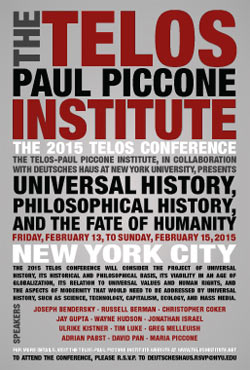 Hegel’s lectures on the philosophy of history chart the development of free, reflective self-conscious selves, but what exactly does that mean? For skeptics, it doesn’t mean much, as Hegel notoriously appears to ground this development in the development of the state. This has inspired Popper’s well-known accusations that Hegel was a puppet of the Prussian monarchy, the “enemy of the open society,” etc., etc., and that the “free” subjects of the state as Hegel describes it are anything but. Further, from Marx to Habermas, Hegel is indicted as one who adopts a quietist attitude of priestly monasticism, so while those imbued with the proper critical, historical consciousness are busy trying to change the world according to the dictates of one or another praxis philosophy, Hegel is content to contemplate it as it goes up in flames. Habermas sees in Hegel’s mature work a “blunting of critique” and a “stoic retreat” from the problems of modernity, the very ones that Habermas believes the younger Hegel so incisively diagnosed.
Hegel’s lectures on the philosophy of history chart the development of free, reflective self-conscious selves, but what exactly does that mean? For skeptics, it doesn’t mean much, as Hegel notoriously appears to ground this development in the development of the state. This has inspired Popper’s well-known accusations that Hegel was a puppet of the Prussian monarchy, the “enemy of the open society,” etc., etc., and that the “free” subjects of the state as Hegel describes it are anything but. Further, from Marx to Habermas, Hegel is indicted as one who adopts a quietist attitude of priestly monasticism, so while those imbued with the proper critical, historical consciousness are busy trying to change the world according to the dictates of one or another praxis philosophy, Hegel is content to contemplate it as it goes up in flames. Habermas sees in Hegel’s mature work a “blunting of critique” and a “stoic retreat” from the problems of modernity, the very ones that Habermas believes the younger Hegel so incisively diagnosed.
|
|
||||
|
Telos Press Publishing · PO Box 811 · Candor, NY 13743 · Phone: 212-228-6479 Privacy Policy · Data Protection Copyright © 2025 Telos Press Publishing · All Rights Reserved |
||||


